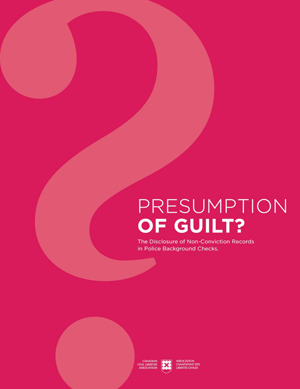Should police be retaining records of their interactions with people that don’t result in convictions and share them in background checks?
That’s one of the questions surfacing in a
report released this morning by the Canadian Civil Liberties Association. “Disclosing this type of

sensitive information may undermine the presumption of innocence,” reads the report that sounds the alarm about records related to withdrawn criminal charges, findings of not guilty, charges never laid, and non-criminal interactions such as mental-health situations.
“Employers who receive negative records checks may not fully understand the distinctions between different types of police information, creating a significant risk that non-conviction records will be misconstrued as a clear indication of criminal conduct. In the case of mental health records, this information may lead to illegal discrimination against those with mental disabilities.”
While the report notes there’s no comprehensive data on all of these situations, it found there are about 125,000 non-conviction records created each year as a result of withdrawn charges, stays or acquittals. It notes the number doesn’t even include records of situations that don’t result in charges.
“The scope of this issue is enormous,” said CCLA general counsel Nathalie Des Rosiers. “During the G20 weekend in Toronto, over a thousand individuals were arrested — many of whom were fingerprinted and photographed. Several hundred were charged with various crimes only to have the charges withdrawn in the overwhelming majority of cases. Just last week, hundreds of individuals charged following mass arrests during the Quebec protests had all their charges withdrawn. These are the types of interactions that are being recorded in police databases and can show up in police background checks.”
What’s more, the report noted the procedures governing the retention and release of such records exists in a legislative vacuum. As a result, it makes a number of recommendations for change:
• Non-conviction records should be regularly reviewed and destroyed in the majority of cases.
• Non-conviction records should be retained for inclusion in a police background check only in exceptional cases where police believe that doing so is necessary to reduce immediate threats to public safety.
• Affected individuals should have the right to make submissions on a decision to retain non-conviction information.
• Individuals should have a right of appeal to an independent adjudicator.
• Disclosure of non-conviction records should occur only in certain employment or volunteer positions.
• Provincial human rights legislation should protect people from unwarranted discrimination on the basis of non-conviction records.
• Monitoring should be in place on the use and impact of all forms of police background checks.

 sensitive information may undermine the presumption of innocence,” reads the report that sounds the alarm about records related to withdrawn criminal charges, findings of not guilty, charges never laid, and non-criminal interactions such as mental-health situations.
sensitive information may undermine the presumption of innocence,” reads the report that sounds the alarm about records related to withdrawn criminal charges, findings of not guilty, charges never laid, and non-criminal interactions such as mental-health situations.